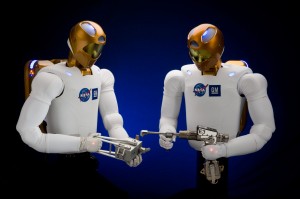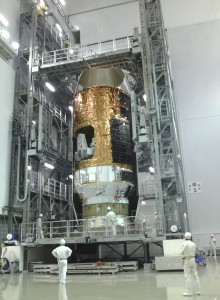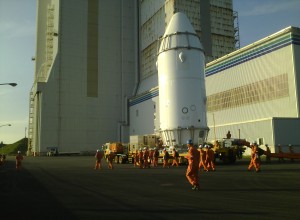Archive for the ‘Space News’ Category
Falcon 9 v1.1 Test
Yesterday (September 29th), SpaceX launched the newest version of its Falcon 9 rocket, which includes an improved payload capacity of 13 tons to Low Earth Orbit. The new rocket also featured a preliminary version of the reusability package that SpaceX hopes will allow them to recover their rockets in a state suited to rapid turn-around, but there was no expectation that this rocket would return safely.
The primary payload this time was the Canadian Space Agency’s CASSIOPE satellite, which was launched into polar orbit. The CASSIOPE combined two distinct functions – the e-POP, which is supposed to gather information on solar storms, and Cascade, which is a technology demo for a digital broadband courier service. There were also five nano satellites on board.
Here’s the video from the launch. Unfortunately, there’s a lot of ‘Awaiting Vehicle Downlink’, and I wish they had just switched to a screen with telemetry data whenever the signal was lost. Still, the camera they had on the Falcon 9 provided a great view when the connection was active.
The Cygnus/Antares Launch
In a September full of test launches (Minotaur V and Epsilon), here’s the latest offering: Orbital Sciences’ Cygnus cargo craft on the Antares rocket making its first demonstration flight to the International Space Station. With this, Orbital Sciences aims to be the second private company cleared for cargo transfers to the ISS, after SpaceX.
I like the Antares rocket launches because we get camera views of stage separation. On the first Antares launch, we got camera of the payload fairing separation as well – a relative rarity – but we didn’t get that this time.
Here’s the video of today’s launch, which occurred at 7:58 a.m. PST:
Two Truly Spectacular Maiden Flights – Minotaur V and Epsilon
It’s pretty rare that we get two magnificent new launch vehicles getting their first flight within a week of each other, but that’s what happened with the LADEE/Minotaur V launch on Sept. 7th and the SPRINT-A/Epsilon launch on Sept. 14th. Both rockets use a series of solid stages to boost their payload – the Minotaur V puts 630 kg into geosynchronous transfer orbit or, in the case of LADEE, 437 kg into trans-lunar trajectory, while the Epsilon puts 1200 kg into low Earth orbit.
The benefit to solid stages are that they are cheap and relatively non-volatile (unlike cryogenic fuels). As you’ll see in the videos, they also get going rather quickly (that is, they have a very high thrust-to-weight ratio). The downside is that they are relatively inefficient in terms of ISP, and so aren’t suited to heavy loads in the upper atmosphere/space. They are also not throttled and lack the safety features of liquid rockets, so they aren’t used for manned flights.
Without further ado, there are the spectacular videos of the launches:
Kirobo and the HTV-4/H-IIB Launch
And here I thought that the KOUNOTORI4 was just a normal ISS cargo delivery launch, but no! The web is abuzz with the fact that it was delivering some extra-special cargo – namely this:
That’s Kirobo – a merry little robot designed for space that can speak Japanese – including voice and speech recognition. It is going to assist the next commander of the ISS, Koichi Wakata, in experiments to demonstrate the usefulness of robots in space. NASA has been working on a less personable but more functional robot – Robonaut-2:
I think the future probably lies somewhere between Kirobo and Robonaut-2, and soon, the whole idea of walking, talking humanoid robots won’t just be science fiction anymore (at least in low-gravity environments, where the whole walking thing is a bit easier for the robots).
Anyway, here’s the video of the rollout of the H-IIB rocket and the launch to the ISS, courtesy of SpaceVidsNet on YouTube:
Astronaut Chris Cassidy Explains the Helmet Leak
If you’ve been following space news at all recently, you probably heard that on an ISS spacewalk, there was a malfunction in astronaut Luca Parmitano’s suit that led to water slowly leaking into his helmet. The flow was such that they were able to take a measured approach to considering the situation and getting Parmitano back inside the station (and even take some photos while ground control was mulling over the issue), but it could easily have been much more desperate if the flow had been worse.
I don’t know about you, but I’ve been eager to hear an explanation on what happened, and NASA has just released a video from Luca’s companion on the spacewalk, Chris Cassidy. So, here’s what we know so far:
It sounds like, for now, the rest of the spacewalk hasn’t been rescheduled. There’s no telling how long it will be before they can certify that the problem won’t recur on other suits or come up with a fix. It’s already been quite a while, and I’m a bit disheartened to hear that they haven’t figured it out to the extent that they can get a new spacewalk scheduled.
Kounotori4 / H-IIB Launch on August 4th
KOUNOTORI4 is the fourth H-II Transfer Vehicle (HTV) destined for launch from the Japanese Space Agency JAXA to the International Space Station. It is an unmanned resupply vessel, but unlike the Progress or ATV, it can carry International Standard Payload Racks to the station – only the SpaceX Dragon provides an alternative for that function. Also, plans for the HTV are to make it both reusable like the Dragon, and eventually suited to carry a crew of three from the station by 2022. So this spacecraft is going to be a part of the future of manned spaceflight.
Here it is being fitted to its fairing:
And here the payload fairing is being moved to the VAB where it will be placed at the top of the H-IIB launcher. There’s something unaccountably amusing about this photo:
The launch is currently scheduled for August 4th from the Tanegashima Space Center. The H-IIB launcher is a heavy lifter from Mitsubishi with a launch mass of 531 tons and it can manage a 19,000 kg payload to Low Earth Orbit. The HTV is 16,500 kg.
On its return, the Kounotori will be loaded with waste, deorbited, and disintegrate on reentry over the Pacific Ocean. The reusable version is scheduled for 2018.
Incidentally, the name “kou no tori” (こうのとり) means “white stork”, which is a bringer of good luck.
Alphasat and Insat 3-D/Ariane 5 Launch
This was a launch of the massive Ariane 5 rocket on July 25th, 2013 at 19:54 UTC from French Guiana carrying a total of 9760 kg into geostationary orbit. The payloads were Alphasat I-XL, which was put into up for Immarsat‘s Broadband network service, and INSAT 3-D, which is an Indian space research satellite.
The Ariane 5 is the workhorse of the European Space Agency, and there was very little by way of drama in this launch – it was just very pretty to watch. The Ariane 5 was intended as a human-rated launch system, so after its first few troubled years it’s been very reliable. Unfortunately, they scrapped the manned spaceplane Hermes that Ariane 5 was supposed to carry, so it has not been used for manned missions. It does carry the unmanned Automated Transfer Vehicle (ATV) to the International Space Station.




